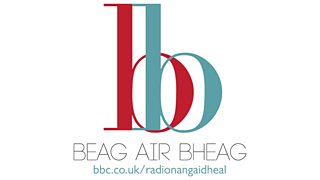Oisean a’ Ghrà mair Sreath 12: 8
CRIOMAG: Dr Fionnlagh MacLeòid, (‘Leugh an Leabhar: Nis Aosmhor’)

1. PERFECT TENSE / TRÀTH COILEANTA: Tha e AIR...
Faic Oisean 6 & Oisean 7.
AUDIOCLIP 1:
“Tha e air a bhith mach à clò bho chionn fhada.”
“It has been out of print since way back.”
AUDIOCLIP 2:
“Agus seo e air a thighinn a-mach man a bha e, ach a-mhàin gu bheil na deilbh air a bhith digitised.”
And here it is, (it has) come out as it was, except that the photos have been digitised.
AUDIOCLIP 3:
“A thaobh na daoine a’ coimhead air ais air ann an dòigh eadar-dhealaichte, dè an atharrachadh tha còrr is fichead bliadhna air a thoirt air a sgìre?”
“As regards people looking back on it in a different way, what change has twenty years and more brought on the district?”
AUDIOCLIP 4:
“Tha attention span air druideadh ’s air dùnadh suas.”
“Attention span has shrunk and has closed up.”
2. THA ... RI ... Tha rudeigin ri dhèanamh. Something’s to be done.
AUDIOCLIP:
“Tha barrachd oidhirp ri dhèanamh airson gun urra dha daoine dhan a’ race dha bheil thusa, ionnsachadh de man [ = ciamar] a leughas iad deilbh dhubh is geala mar seo.”
“There’s more of an effort to be made so that people of your generation are able to learn how to read (‘how they read’) black and white photos like these.”
A bheil càil ri chluinntinn? Is there anything to hear / to be heard?
Tha barrachd oidhirp ri dhèanamh. There’s more effort to be made.
Bha cus ri dhèanamh. There’s too much to do, to be done.
Tha cus ri leughadh an seo. There’s too much to read / to be read here.
Bidh tòrr ri fhaicinn san taisbeanadh. There’ll be plenty to see / to be seen in the exhibition.
Chan eil càil ri fhaighinn an seo. There’s nothing to be found here, nothing to be got here.
Bidh an t-agallamh ri fhaighinn air-loidhne. The interview will be available (‘to be had, to be found’) online.
Cha robh mòran a bharrachd ri ràdh. There wasn’t much more to be said, not much more to say.
Thoir an aire / Note:
a’ cluinntinn - ri chluinntinn
a’ dèanamh - ri dhèanamh
a’ faicinn - ri fhaicinn
a’ faighinn - ri fhaighinn
3. AIR BEULAIBH, AIR CÙL ‘In front (of)’, ‘Behind, at the back (of)’
AUDIOCLIP:
“An seòrsa dealbh a th’ air do bheulaibh ann an sin anns an leabhar sin, ’s e th’ann ach rud tur eadar-dhealaichte.”
“The kind of photo that’s in front of you there in that book, that’s something completely different.”
air beulaibh an taighe - in front of the house
air beulaibh sluagh mòr - in front of a big crowd
air beulaibh an eich - in front of the horse
in front of me / you / him , her / us / you(s) / them:
air mo bheulaibh - in front of me (‘on my front’) bh!
air do bheulaibh - in front of you (‘on your front’) bh!
air a bheulaibh - in front of him (‘on his front’) bh!
air a beulaibh - in front of her (‘on her front’)
air ar beulaibh - in front of us (‘on our front)
air ur beulaibh - in front of you (‘on your front)
air am beulaibh - in front of them (‘on their front’)
AIR CÙL - ‘behind, at the back (of)’
air cùl an taighe - behind the house, at the back of the house
air cùl na sgoile - behind the school, at the back of the school
air cùl balla àrd - behind a high wall, at the back of a high wall
behind me / you / him , her / us / you(s) / them:
air mo chùl - behind me (‘my back) ch!
air do chùl - behind you (‘your back’) ch!
air a chùl - behind him (‘his back’) ch!
air a cùl - behind her (‘her back’)
air ar cùl - behind us (‘our back’)
air ur cùl - behind you(s) (‘your back’)
air an cùl - behind them (‘their back’)

